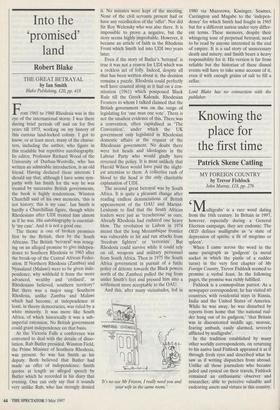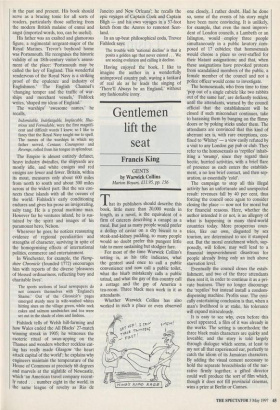Knowing the place for the first time
Patrick Skene Catling
MY FOREIGN COUNTRY by Trevor Fishlock John Murray, £18, pp. 276 Mulligrubs' is a rare word dating from the 16th century. In Britain in 1997, however, especially during a General Election campaign, they are endemic. The OED defines mulligrubs as 'a state of depression of spirits; a fit of megrims or spleen'.
When I came across the word in the same paragraph as 'gudgeon' (a metal socket in which the pintle of a rudder turns) in the very first chapter of My Foreign Country, Trevor Fishlock seemed to promise a verbal feast. In the following pages, the promise was richly fulfilled.
Fishlock is a cosmopolitan patriot. As a newspaper correspondent, he has visited 60 countries, with residential stays in Russia, India and the United States of America. While he was away, he was disturbed by reports from home that 'the national rud- der hung out of its gudgeon,' that Britain was in discontented middle age, morose, fearing ambush, easily alarmed, severely afflicted by mulligrubs'.
In the tradition established by many other worldly correspondents, on returning to his native land Fishlock appraised it as if through fresh eyes and described what he saw as if writing dispatches from abroad. Unlike all those journalists who became jaded and cynical on their travels, Fishlock remained an enthusiastic observer and researcher, able to perceive valuable and endearing assets and virtues in this country, in the past and present. His book should serve as a bracing tonic for all sorts of readers, particularly those suffering from the modem British malaise of ennui and angst (imported words, too, can be useful).
His father was an exalted and glamorous figure, a regimental sergeant-major of the Royal Marines. Trevor's boyhood home was Portsmouth. He recognises the historic validity of an 18th-century visitor's assess- ment of the place: `Portsmouth may be called the key of England. This wonderful rendezvous of the Royal Navy is a striking proof of the opulence and industry of Englishmen.' The English Channel's `changing temper and the traffic of war- ships and merchant vessels,' Fishlock writes, 'shaped my ideas of England.'
The warships' awesome names,' he recalls, Indomitable, Indefatigable, Implacable, Illus- trious and Formidable, were the first magnifi- cent and difficult words I knew; so I like to fancy that the Royal Navy taught me to spell. The names of the warships in which my father served, Centaur, Courageous and Revenge, rolled from his tongue in splendour.
The Empire is almost entirely defunct, heavy industry dwindles, the shipyards are mostly idle, and white ensigns and red ensigns are fewer and fewer. Britain, within its moat, measures only about 600 miles from north to south and about 300 miles across at the widest part. But the sea con- nects these islands with all the oceans of the world. Fishlock's early conditioning endures and gives his prose an invigorating, salty tang. He is a proud maritime man. However far he ventures inland, he is sus- tained by the spirit and images of his paramount hero, Nelson.
Wherever he goes, he notices reassuring evidence of regional peculiarities and strengths of character, surviving in spite of the homogenising effects of international politics, commerce and entertainment.
In Winchester, for example, the Hamp- shire Chronicle (founded 1772) encourages him with reports of the diverse 'pleasures of blessed ordinariness, reflecting busy and charitable lives'.
The sports sections of local newspapers do not concern themselves with 'England's Shame.' Out of the Chronicle's pages emerged sturdy men in wife-washed whites hitting sixes on the village green, while rock cakes and salmon sandwiches and tea were set out in the shade of elms and lindens.
Fishlock tells of Welsh hill-farming and how Wales ended the All Blacks' 27-match winning streak in 1905; he witnesses the esoteric ritual of swan-upping on the Thames and wonders whether reckless eat- ing has really made Glasgow 'the heart attack capital of the world'; he explains why engineers maintain the temperature of the House of Commons at precisely 68 degrees and marvels at the nightlife of Newcastle, which 'an American travel company recent- ly rated . . . number eight in the world, in the same league of revelry as Rio de Janeiro and New Orleans'; he recalls the epic voyages of Captain Cook and Captain Bligh — and his own voyages in a 57-foot ketch from the Azores to remotest Scot- land.
In an up-beat philosophical coda, Trevor Fishlock says:
The trouble with 'national decline' is that it posits a golden age that never existed . . . We are seeing evolution and calling it decline.
Having enjoyed the book, I like to imagine the author in a wonderfully unimproved country pub, waving a tankard of real ale as he leads the singing of `There'll Always be an England,' without any fashionable irony.



































































 Previous page
Previous page